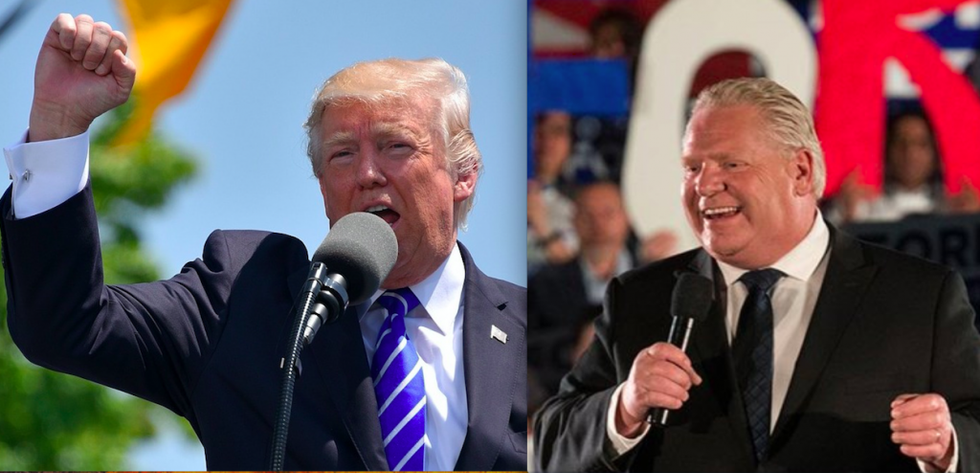
It's no longer enough to care. Today only anger will do. And as good as anger may be, rage is better. Never have so many been so angry about so much.
Who can blame them? There's no end of things to be angry about. The difference now is that anger is not the subtext; it's out in the open, fully acknowledged, the first thing on everyone's mind.
Our leaders aren't entirely to blame, but they've certainly played a major role in bringing anger to the fore and making it the dominant emotion of our times.
READ: Doug Ford Promised Ontario This Housing ‘Plan’ Pre-Election: What Will Become Of It?
But are they a cause or a result? Probably a bit of both.
The obvious example, of course, is U.S. President Donald Trump.
He has become one of the most powerful people on the planet on the basis of little more than anger. His readiness to rant, rail and rave, lie, threaten, cheat and insult has empowered his supporters to do the same.
Trump's appalling behaviour would have ended the career of any conventional politician long ago, but his base adores him not despite his awfulness but because of it.
Last week Trump's fans cheered and applauded when he ridiculed, mocked and belittled Christine Blasey Ford for her testimony against now U.S. Supreme Court Justice Brett Kavanaugh. Their unabashed enthusiasm was a deeply disturbing spectacle.
Typically, people keep their misogyny and prejudices to themselves. Now it's out in the open, loudly and clearly.
And let's not forget Kavanaugh himself.
His display of arrogance, entitlement and white male rage was unprecedented in its lack of self-consciousness. In a different era, it would have spelled the end of his career. But the language of anger is spoken by more of us than ever.
Lest we Canadians think we're superior, keep in mind that Ontario recently elected Doug Ford as Premier of Ontario.
Unlike Trump, who had no previous political history, Ford was a known commodity. He served as a councillor from Etobicoke during his brother, Rob Ford's, disastrous term as mayor of Toronto (2010-2014). That makes his ascension to power that much more problematic.
READ: Uber Providing Free Rides To Polls On U.S. Election Day. Hey, Uber, Toronto Election Day Is Oct. 22.
It reveals his supporters' willingness to vote for a man who has never moved beyond anger and frustration. Indeed, Doug Ford trades in rage.
Though he claims to govern in the name of the people, he appeared to abandon them when he cancelled workplace reforms and a minimum-wage hike from $14 to $15. The villain, in this case, the target of his anger, was his Liberal predecessor, Kathleen Wynne.
In May, Ford laughed when someone at an election rally began to chant, "Lock her up." The Trumpian overtones were lost on no one.
Though Ford distanced himself from his fan's actions, his antipathy for Wynne is reminiscent of Trump's vilification for Hillary Clinton, who won more votes than he did and still lost the election.
Ford's anger encompasses more than the Ontario Liberal Party.
His unexpected move to cut Toronto city council from 47 members to 25, for example, was widely interpreted an act of revenge on a city that never took him seriously.
READ: Premier Doug Ford Overrules Judge With Notwithstanding Clause And Makes History
It's no surprise many observers see Ford as a bully.
As health minister Christine Elliot inadvertently made clear several weeks, even cabinet ministers must wait for the premier to make their decisions for them.
But shock we still feel at actions such as these is increasingly out of date.
Emboldened by the example of Donald Trump, Ford doesn't have to worry: the qualities that would have made him unacceptable until recently are now the source of his appeal.
His reliance on emotion over rationality resonates with a large numbers of voters — mostly suburbanites and poorly-educated middle-aged men whose existence has become precarious — who feel forgotten and dispensable.
The terrible irony is that neither Trump nor Ford are capable of understanding, let alone solving such problems, including those caused by the globalization. If anything, they will make things worse, especially for many of their supporters.
READ: On Premier Doug Ford And Why Toronto’s Municipal Election Is Important For All Canadians
On the other hand, decades of mainstream leadership, insider politics, and elitist priorities have left a large segment of the population full of resentment and, yes, anger. They feel ignored and even despised.
Hillary Clinton played into Trump's hands when she referred to his supporters as a "basket of deplorables."
The biggest obstacle to the Trumps, Fords, and their ilk is the city.
Around the world, the forces of authoritarian hard-right, anti-immigrant, anti-regulation, anti-government, anti-public realm, anti-environmentalist, anti-feminist conservatism are least popular in urban cultures.
When Doug Ford ran for mayor in Toronto in 2013, he was defeated by John Tory. Even in the provincial election this year, the Ford Conservatives lost every riding but one in "old" Toronto. By contrast except for a handful of ridings that remained Liberal, the Tories won Scarborough, North York, Etobicoke and, needless to say, suburban and rural Ontario.
READ: How Doug Ford Exploits Ontario’s Growing Urban/Suburban Divide
And let's not forget, unlike the rest of the U.K., 60 per cent of Londoners voted against Brexit.
Even more telling was how Trump fared in his hometown, New York City, in the 2016 U.S. presidential election. Though he did better in some boroughs than others, overall, he gained a paltry 18 per cent of votes.
Makes one wonder whether Ford's attack on Toronto political governance was a pre-emptive strike intended to weaken resistance.
In any case, the city can expect a rough ride from Queen's Park in the years ahead.
Reducing council and up-loading the subway are hints of what's to come. Already one thing is certain:
It won't be pretty.




















